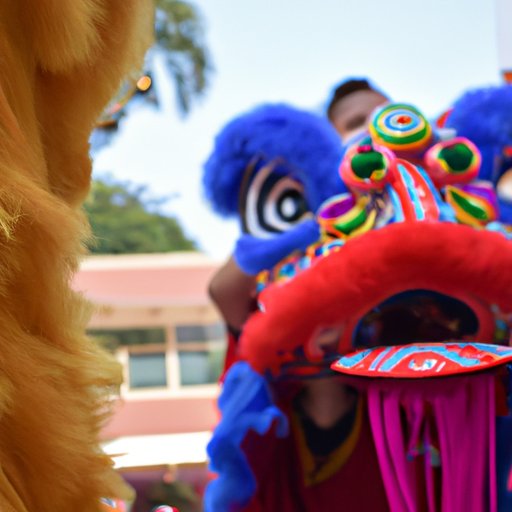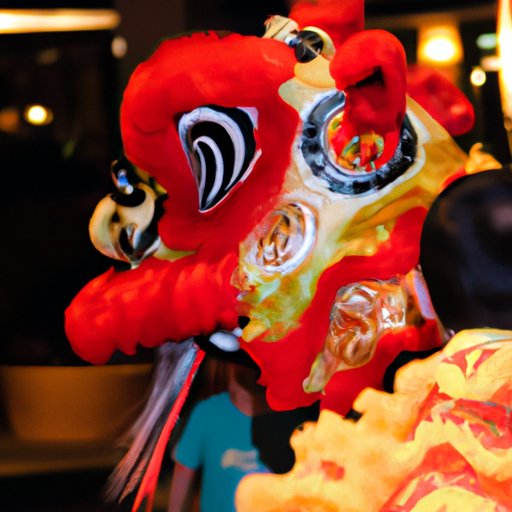Introduction
The Chinese lion dance is an ancient tradition that dates back centuries. It is a popular form of entertainment in many parts of Asia and is often performed during festivals and special occasions. The dance is usually performed by two people wearing colorful lion costumes and accompanied by music and drums.
The Chinese lion dance is steeped in symbolism and has been used for centuries to bring good luck and fortune. It is also used to represent different aspects of Chinese culture such as courage, strength, and perseverance. In this article, we will explore the meaning behind the Chinese lion dance and its importance in Chinese culture.

Exploring the Meaning Behind the Chinese Lion Dance
The Chinese lion dance is a highly symbolic and meaningful ritual in Chinese culture. It is believed to bring good luck and fortune to those who witness it, as well as ward off evil spirits. The dance is also seen as a way to honor the gods and ancestors, as well as express gratitude for the blessings they have bestowed upon the community.
The Chinese lion dance is a vibrant and lively performance. It is usually performed by two people wearing brightly colored lion costumes, with one person as the head and the other as the tail. They are accompanied by loud drumming and music. As the dancers move around, they mimic the movements of a lion, such as roaring and jumping.
The Chinese lion dance is also associated with certain rituals and traditions. Before the performance begins, the performers usually bow to the gods and offer incense as a sign of respect. During the performance, the dancers may also interact with audience members and hand out red envelopes filled with money as a symbol of good luck.
The Chinese lion dance is more than just a performance; it is also a representation of Chinese culture and values. The lion is seen as a symbol of courage and strength, while the bright colors and lively movements are thought to bring joy and good fortune to those who witness it. The lion dance is also used to celebrate special occasions, such as the Lunar New Year, and to pay respects to the gods and ancestors.
A Comprehensive Guide to the Symbolism of the Chinese Lion Dance
The Chinese lion dance has a rich and storied history. It is believed to have originated in China during the Tang Dynasty (618-907 AD). The dance was initially used as a form of entertainment for the royal court and was later adopted by the common people. Over time, the dance evolved to include more elaborate costumes and movements.
The color, music, and movement of the Chinese lion dance all play an important role in its symbolism. The vibrant colors are thought to bring good luck and fortune, while the music and drums are believed to ward off evil spirits. The movements of the lions are also carefully choreographed to reflect the grace and power of the animals.
The Chinese lion dance is also used to bring good luck and fortune to those who witness it. During the performance, the dancers may pass out red envelopes filled with money or candy as a sign of good luck. The lion dance is also thought to bring prosperity and abundance to those who witness it.
Conclusion
The Chinese lion dance is a highly symbolic and meaningful ritual in Chinese culture. It is steeped in symbolism and has been used for centuries to bring good luck and fortune. The vibrant colors, music, and movement of the dance are all thought to bring good luck, while the rituals and traditions associated with the lion dance are used to honor the gods and ancestors. Learning more about the symbolism of the Chinese lion dance can help us to better understand and appreciate the culture and traditions behind it.
(Note: Is this article not meeting your expectations? Do you have knowledge or insights to share? Unlock new opportunities and expand your reach by joining our authors team. Click Registration to join us and share your expertise with our readers.)
